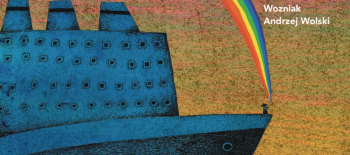Agata TUSZYŃSKA and Piotr PAZIŃSKI, two prominent voices from the world of Polish contemporary literature whose work has been published in foreign languages, will be in conversation with Małgorzata SMORĄG-GOLDBERG (Paris IV Sorbonne) in an exploration of Bruno SCHULZ’s heritage, the way he remains a permanent feature in the literary landscape, how he reinvented himself and the transformation which he underwent. The authors will also be discussing their own work.
+++ PRACTICAL INFORMATION
Bruno SCHULZ is one of the most important voices of Polish literature from the interwar period. He discovered his own unique way of describing the Jewish world, of bringing its souls and reminiscences to life, and of freeing it from its material contingencies. His impact on later generations of writers is undeniable. Seventy years after his death, as his work is entering the public domain, Bruno SCHULZ continues to fascinate, both as an author and a character: the entirety of his oeuvre has been retranslated into French (by Alain VAN CRUGTEN); his correspondence has just appeared in Dutch (by Kris VAN HEUCKELOM and André ROOSEN); the German writer Max BILLET published Im Kopf von Bruno Schulz; in 2015 the Belgian writer Alain VAN CRUGTEN issued a play entitled Bruno Schulz ou La Grande Hérésie, etc.
The two writers we have invited, Agata TUSZYŃSKA and Piotr PAZIŃSKI, are both among his heirs, and both have been translated into French (Agata TUSZYŃSKA has also been translated into English). With them, Małgorzata SMORĄG-GOLDBERG (Paris IV Sorbonne), a leading expert on Schulz, will explore the expression of Schulz’s legacy, its permanence, how it has been reinvented and transformed. Is there such a thing as Schulzian literature? Is there such a thing as Polish Jewish literature?
PRACTICAL INFORMATION
>>> International House for Literature Passa Porta (rue Dansaert 46, 1000 Brussels) – see map
>>> Tuesday 16 May 2017 – 20:00
>>> €7 | €5 [online booking]
+++ on the website of Passa Porta
Agata TUSZYŃSKA (1957) is a theatre expert, literary historian, poet and literary reporter. She will pay particular attention to female figures, providing us with elaborate portraits (Maria Wisnowska, Irena Krzywicka, Wiera Gran, Józefina Szelińska). The literature which she produces is marked by the notion of memory and the problems it raises (forgetting, shame, transformations of which one is not aware, manner in which we help it to continue to exist, etc.). The Holocaust is a significant element here, and TUSZYŃSKA does not hesitate to add a personal touch to her work by exploring the link between the Holocaust and her family history. Translated into more than 10 languages, she has enjoyed some success in French, notably with her novels – published by Grasset & Fasquelle – Une histoire familiale de la peur (2006), Exercices de la perte (2009), L’Accusée : Wiera Gran (2011) and La fiancée de Bruno Schulz (2015) which made the shortlist for the Femina and Medicis prizes for foreign literature in 2015.
Piotr PAZIŃSKI (1971) is a journalist, essayist, literary critic and translator of English. He is the editor of the Jewish review Midrasz. He has written about James Joyce and penned two novels: Pensjonat and Ulice ptasie, two books on the duty of remembering and researching ones roots. Pensjonat, whcih received the European Union Prize for Literature in 2009 and the Paszport Polityki Prize the following year (equivalent to the Prix Rossel in French-speaking Belgium), was published in 2016 by Gallimard under the title Pension de Famille. Pazinski is considered to be the best Polish Jewish author to emerge from the third generation after the Holocaust. Pension de famille has already been translated into Czech, German and Serbian.
Malgorzata SMORĄG-GOLDBERG is a lecturer at the Department for Slavic Studies at Paris-Sorbonne University and a researcher at CIRCE (Centre Interdisciplinaire de Recherche Centre-européenne). A graduate of the Ecole Normale Supérieure, Yale University and the Sorbonne, she is a specialist in Polish and central European literature. In parallel to her classes, she conducts research on the avant-garde in fiction in Polish literature of the 1930’s, notably on Witold Gombrowicz and Bruno Schulz, about whom she is currently working on a book entitled Constructions identitaires des artistes juifs centre-européens: cas de Bruno Schulz. She also translates from Polish.
Links
Passa Porta: http://www.passaporta.be





